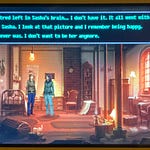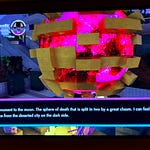Firewatch
by Panic, Inc.
Released on MacOS in 2018
The first time Jess and I held hands was at the Wissahickon. I was in a depressive slump, waiting for another medication adjustment. Against all expectations, Jess wouldn’t give up on me. One Saturday, after breakfast at a prefab diner somewhere in Northwest, we went to the park, hiking the trails and stopping for pictures at old stone structures. We followed signs to Daisy Field, Jess excited to see an ocean of flowers, only to find an empty baseball diamond. She was sincerely, charmingly angry. I offered her my hand to squeeze in a, you know, platonic, get out the frustration kind of way. She squeezed hard. To divert her attention, I asked her what video games she’d been playing lately. She told me about Dragon Age. I don’t remember much about the game, but I remember threading my fingers through hers. We were still just friends, ostensibly.
Near one of the park’s entrances is a unisex bathroom with a composting toilet. My friend George offered to make a donation to have it named after him. If park benches can have memorials to drowned children from fifty years ago, then why can’t the name of an experimental musician/realtor/family man/lifelong Philadelphian grace the door to a restroom? But the powers that be said it doesn’t work that way, and George’s dream went unfulfilled.
The first time I hung out with Sandro after the start of the pandemic, before vaccines were available, was at the Wissahickon. It felt liberating to sit six feet apart on a park bench and talk unmasked with a friend. We shot the shit, neither of us having much to say about our months of quarantine. I looked around. We were by a baseball diamond. Fucking Daisy Field. I told Sandro about how pissed off Jess got a few years back. He thought it was adorable.
Several months later, Sandro and his wife, Amber, bought a house an hour west of Philly, in a charming town near the prison where Bill Cosby was once held. I visited after my second Pfizer jab, in that brief period where it felt like we were beating COVID rather than giving into it. We walked into a pizza shop maskless, forgetting the state-mandated protocols, and even the workers had let their guard down.
While I sometimes feel a perverse nostalgia for the early days of quarantine–when it felt like there was a modicum of international solidarity in the face of a global pandemic–I understand that I couldn’t have survived it without my partner and housemate to mitigate the isolation and loneliness, without the supreme privilege of having money to overtip drivers who delivered emergency Chinese and Taco Bell, without my ex-mother-in-law sending us hand-sewn masks and disinfectant wipes. For me, 2020 and early 2021 was a sleepover gone too long: despite the self-care and pampering and novelty, at some point, you just want to go home to your regular routine.
I can’t imagine choosing Henry’s life in Firewatch, a monastic existence in the middle of the woods, with only a walkie-talkie for company. What makes me feel safe anywhere–in forests and parks and cities at night–is the presence of groups of people, evidence that others also feel safe enough to be outside. But something’s changed, now that mask wearing and social distancing are largely things of the past. Instead of communal safety, I feel–real or imagined–a kind of peer pressure to let go of my worries and return to pre-pandemic life. The state and public health agencies have long since thrown in the towel. Media outlets across the political spectrum argue against any COVID precautions save for vaccines. No one seems concerned with long COVID or the risk of infection for the disabled or the potential for long-term health ramifications for all of us. I don’t know, man. I know death rates are falling. But I miss feeling like we were all in this together. I miss when large swaths of us gave a shit.












Share this post